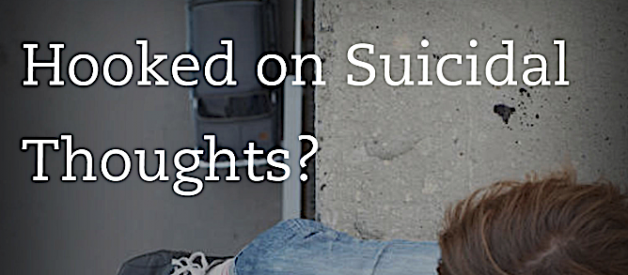Chronic Suicidality and How to Overcome It

?If I didn?t have my suicidality, I would have killed myself years ago? ? a patient with Chronic Suicidality
This is another article in our mission, as the creators of the new suicide prevention documentary, Stay Alive, to help those of you who find this a challenge to stay alive.
I first learned about the syndrome of Chronic Suicidality from Mental Health Comedian, Frank King, who has given five TEDx talks and suffers from Major Depression and Chronic Suicidality.
For my more professional audience Chronic Suicidality is the same as Chronic Suicidal Ideation, but the latter sounds more clinical and sterile, whereas the former is what people live.
As Frank speaks about it in his talks, an example of Chronic Suicidality is that you?re having an okay day and then something upsetting or disappointing happens such as not getting a job and you think, ?Okay, I can pick myself up and look for another job, get stoned or drunk or I can just kill myself.?
When you think it or say it to yourself, you think or say it calmly and as a matter of fact. You usually don?t say it to others because that would only trigger a bunch of nervous and intrusive questions, so they can reassure themselves that you?re not about to do it.
Such questions although understandable and well intentioned can actually annoy people with Chronic Suicidality, who have lived with it sometimes for years, and make them think: ?Damn it, I knew I shouldn?t have told anyone what goes on in my head!? It can actually make them feel worse, because you feel that you have to reassure them that you?re not going to do it. A-a-a-g-h!
What lies beneath Chronic Suicidality?
When you feel upset or mildly disappointed or rejected and so easily think ?I feel like killing myself,? what is going on underneath?
When something upsetting or disappointing happens to you, you can quickly feel scared, anxious and within moments even panicky. Let?s say that makes you want to run and there is no place to run, even in your mind.
That?s the point where you reach inside yourself and hope you?ll come up with a feeling that you can make it through whatever has just happened.
At the polar opposite of people who reach inside to come up with a way to make it through upsets are champion athletes. That?s the point where they reach inside and come up with what is referred to as ?heart.? Those champions often developed that heart because of what was poured into them from their parents, teachers and coaches that connected with them, stuck with them and empowered them to feel and know they could get through any adversity.
But imagine that when you reach inside you come up with either nothing, or possibly at an unconscious level you come up with a combination of what you received during your childhood, namely criticism, abuse, ridicule, sarcasm, blame or just utter neglect.
If that is what you received as a child and it made upsets not just worse, but made them horrendous, and you were powerless to do anything about it, a seed may have planted in you where you thought and promised yourself, ?When I get older and this happens to me, I will not be powerless to stop it. Before I go back to feeling this I will have the power to end it by just killing myself.? That promise and the belief you can always get out the pain by killing yourself becomes something you go back to over and over again when dealing with disappointment later in life.
Having that option is comforting in a way that people who never think that way will ever understand. That is why you don?t tell them you feel like killing yourself.
The Lion King Solution
Remember Disney?s classic movie and play the Lion King. It?s the story of Simba who early on is feeling the strength and protection of his father, Mufasa, but who is then brutally thrown to his death by the evil Scar.
Simba grows but without the love and strength of his father feels that he can?t make it through his challenges as a young adult lion.
However, because Simba had a childhood where he was loved and protected and empathized with by his parents and especially his father, he is finally able to turn inside and call upon the image of his father to give him just that boost of confidence and courage to help him push through whatever challenges he faces.
In fact, here is a scene in which he sees the image of Mufasa in the clouds doing just that.
If you?re someone with Chronic Suicidality, every time you hit an obstacle or disappointment and momentarily blocks your forward progress, you reach inside and instead of coming up with an internalized Mufasa to talk and walk you through it, you re-experience a traumatic childhood experience of abuse or abandonment as if you were instead raised by an evil Scar, that you have promised yourself you won?t go through again.
That?s when you reach the pain relieving thought, ?Well I can always kill myself and make all the pain go away.?
How to overcome Chronic Suicidality
One of the ways to get past this and even over this is through the magical and healing power of loving, caring and empowering mentors.
I know that all too well, because that?s what I did.
When I was in medical school, I dropped out twice and still graduated. In retrospect I believe I was suffering from untreated depression.
The second time, I sought to drop out (I wasn?t failing), the school wanted to kick me out, because they didn?t want a second round of loss of matching funds when a medical student left a seat unoccupied. I couldn?t blame them. I certainly looked as if I wasn?t ever going to graduate or be doctor material.
It was my good fortune that the Dean of the School was concerned that if I was told that I was being kicked out and that was on top of having already dropped out before, that I might hurt myself, maybe even kill myself.
He then referred the matter to the Dean of Students, William McNary, who we referred to as Mac and who met with me to tell me of the main Dean?s recommendation that I be asked to withdraw.
He told me: ?Mark, you didn?t screw up (I was passing my classes), but you are screwed up. But if you got unscrewed up, I think this school would be glad they gave you a second chance (What! He was daring to go against the Dean of the school?s wishes?).?
When he said that, I was overcome with emotion, because I felt so useless, worthless and hopeless and he was being so compassionate.
If he had said, ?Let me know if I can help you,? I never would have reached out to him. I would have probably gone back to my apartment because of foolish pride and who knows, might have killed myself.
But what prevented that is that when I felt at my lowest point which miraculously occurred in Mac?s presence, he did three things that forever changed and possibly saved my life:
?Mark, even if you don?t get unscrewed up, even if you don?t become a doctor, even if you don?t do anything the rest of your life (which is what I thought I was capable of ), I?d be proud to know you, because you have a streak of goodness* that we don?t grade in medical school and that the world needs more than you can imagine. And you won?t know how much the world needs you until you?re 35, but you have to make it until your 35. And, look at me! (I was looking away because I felt so overcome by his onslaught of belief in me) You deserve to be on this planet and you?re going to let me help you.?
I started sobbing, couldn?t look at Mac, and limply raised up my left hand towards him and said, ?I think I?d like that.?
The three things he did was to immerse me in the trifecta of hope that short-circuited my hopelessness and acute suicidality. He told me he was proud to know me (you mean I wasn?t just a total loser?), that I deserved to be on this planet (and even more was needed by the future) and insisted on helping me (because I was helpless), which he did at his own expense when he stood up to the medical school to defend why I deserved a second chance.
What?s the lesson for you if you have Chronic Suicidality, reach out to people that you know care about you and don?t judge you (even if you judge yourself) and say, ?I need your help.? They won?t let you down.
What?s the lesson for you if you want to help someone who might have Chronic Suicidality? Let them know that you?re proud of them as a person rather than focusing on their actions (which they may not be able to do), that they deserve to be on this planet and that you?re going to help them.
Symptoms of Chronic Suicidality (not the same as acute suicidality or suicidal ideation):
Behavioral Symptoms:
- Overly sarcastic or cynical
- Lack of spark or joy in their eyes, more flat than even sad
- When they?re trying to show enthusiasm for others or themselves, comes off as empty
- Lack of initiative
- Tend to say ?No? or make excuses to others re: fun activities
- Chronic excess drug or alcohol abuse
- Often appears tired or sluggish
- Will often answer questions about, ?Is anything wrong?? with ?I?m fine, just tired?
- Sleep excessively
Physical Symptoms:
- Generally out of shape
- Not watch what they eat because not motivated to eat healthy
- Low energy
- Very sluggish getting out of bed (feel there is nothing to look forward)
Cognitive Symptoms:
- Often thinks, ?I could just kill myself? as knee jerk response to upset
- Slowed thinking by their own standards
- Might appear ?normal? to others, because this is a long term condition they have adapted to
Psychosocial Symptoms:
- Asocial more than anti-social
- After they do something with others often feel exhausted rather than relieved or buoyed up
- Negative about most things
- Frequently sullen
- Anxious about anything requiring more energy than they think they have
*Goodness ? I don?t know how Mac could detect goodness in me, maybe he saw something in me that I couldn?t in this poem I had published in 1972
From Journal of Geriatric Psychiatry, 1972
Lament for the Old
When I was a doctor it was common practice to avoid the geriatrics floor. The most widely used rationalization was the reminder of our own ultimate demise. But since my colleagues knew not how to celebrate life, I doubted that they truly feared death. I then thought it was because we had been taught to salvage life quantitatively and not qualitatively. And it was obvious that this group was a poor bet.
I then took the time to get to know some of these marvelous people, three times my age, who offered a wealth of experience that spanned hundreds of years. What was so obviously missing was someone to share the fullness of the past and to help relieve the loneliness of the future. And maybe someone to give a damn when they died?
– Mr. Goulston is a third-year student at Boston University School of Medicine, Boston, Massachusetts.


